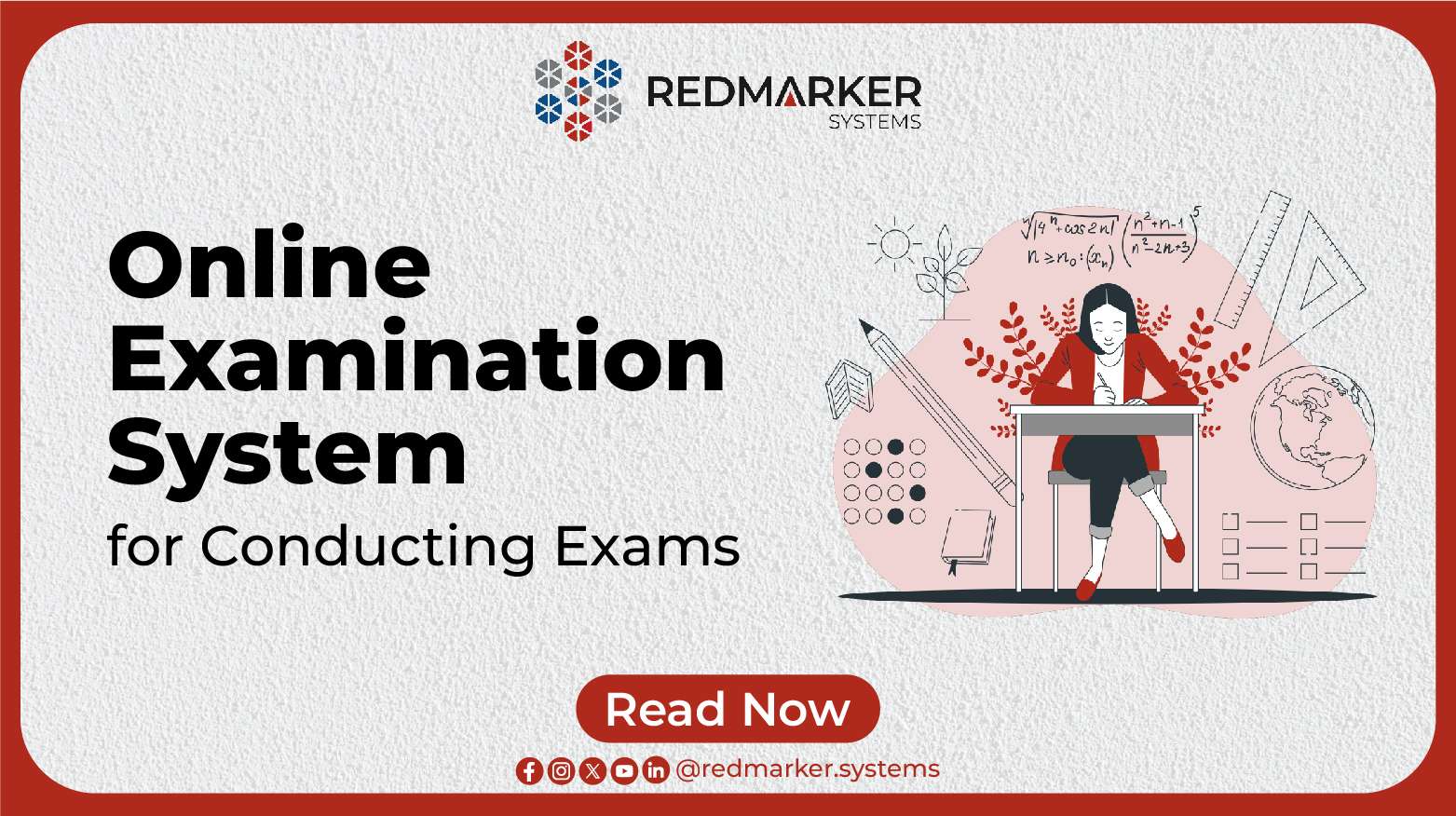
Online Exams: The Smart Choice for Modern Learning and Assessment
Technology has become a part of our lives like never before, as we live in the age of digitalization, our everyday tasks have become simpler – thanks to technological advancements. Digital devices have invaded our daily lives, starting from desktops, crawling up to our laps and then into our palms. The breakthrough happened when this palmtop gained unlimited access to high-speed internet.
The education sector across the world is embracing technological advancements and reaping fruitful results encouraging enough for others to follow online examinations. Online Assessment Platform, online marking software for e-marking & automated assessments as a part of online examinations are implemented by educational institutions on a wider scale. It is a brainer that digitalized assessments immensely benefit not only the teachers and students but the institutions as well.
Surprisingly, digitalization still needs to be made an integral component of Pakistan’s educational system, given its benefits. Here we will discuss the six key reasons that render the digitalization of examination as the ultimate option in the digital age.
“Technology will never replace great teachers, but in the hands of great teachers, it’s transformational.”
– George Couros
Flexibility
Students can take online exams anytime, anywhere, which benefits students with other commitments or scheduling conflicts. Students can complete the exam at their own pace and in a comfortable environment, leading to better performance.
According to a report by the Higher Education Commission (HEC) of Pakistan, online exams were introduced in response to the COVID-19 pandemic to ensure the continuity of education. The report notes that online exams allowed students to take exams from their homes, which benefitted a lot to those with limited mobility or other commitments.
Cost-effective
Online exams are generally more cost-effective than traditional paper-based exams. Because there are no printing or distribution costs, and less staff time is required for grading and administration. Moreover, these can be designed to be self-grading, which saves time and resources. They offer significant cost savings compared to traditional pen-and-paper exams. With online exams, there are no printing or logistics costs, and you don’t need to pay for examination facilities or hire facilitators and invigilators to supervise the exams.
Online assessments do require some expenses, such as administrative costs, email distribution systems, IT support, and online proctoring. However, they are significantly less than the costs associated with traditional exams. Overall, these can help organizations and educational institutions save significant money while still providing a practical and convenient examination experience.
Now is the Right Time!
Enhanced security
One of the main challenges in conducting exams, especially high-profile ones like bar exams, SATs, or final exams, has been ensuring security. Online exams offer greater security since there are no physical papers that can be lost or stolen during the printing and distribution process. Another advantage is that examiners can use question banks that randomly select questions, making it highly unlikely that any two exams will be identical.
This further reduces the possibility of cheating and makes it more difficult for participants to share answers. Therefore, online exams provide a secure and reliable examination experience, especially for high-stakes exams where security is of paramount importance . These are more secure than traditional paper-based exams. They include advanced security measures such as randomized questions, timed exams, and secure browser settings. These features make cheating difficult for students, ensuring that the results are more accurate and reliable.

Improved accessibility
Online exams can be designed to be more accessible to students with disabilities. For instance, they can include features such as screen readers, enlarged text, and alternative input devices. These features help students with disabilities easily take exams, ensuring that they are not at a disadvantage.
Eco-friendly
Remember Greta? The environmental activist challenged world leaders to take action. Well, it’s time to listen to Greta. Go digital to protect the environment. Online tests and e-marking will not only reduce paper consumption but will also aid in protecting the forests and mitigating the climate crisis. With the growing awareness of environmental issues, online exams are a great way to reduce the carbon footprint and positively impact the environment.
Unlike traditional exams that require a lot of paper and generate waste due to printing errors or overestimation of the number of learners, online exams drastically reduce the carbon footprint associated with exam logistics. Thus, choosing online exams over traditional methods is a simple way to contribute to a more sustainable environment.
Data analytics
Online exams provide valuable data analytics to educators and administrators. The data includes information on student performance, exam difficulty, and question analysis. This data can be used to improve teaching and learning outcomes and inform future assessment strategies. Educators and administrators can use this data to identify areas where students struggle and modify their teaching strategies accordingly.
Administrative Burden Alleviation
The switch to digital evaluation guarantees cost reduction by minimizing logistics costs for educational institutions in the following ways.
Automated grading
With online exams, grading and scoring can be automated, which reduces the time and resources required for the manual grading of paper-based exams. It can be beneficial for large classes or exams that many students take.
Reduced paperwork
Online exams can reduce the amount of paperwork involved in administering exams. This includes printing, distributing, and collecting paper-based exams and managing the associated documentation, such as answer keys and grade sheets.
Real-time monitoring
Online exams can be monitored in real-time, which can help to detect and prevent cheating or other forms of academic misconduct. This can be particularly useful for high-stake exams, such as final or certification exams.
Streamlined administration
Online exams can be administered through a single platform or system, which can help to streamline the administration process. This can reduce the administrative burden on teachers, professors, and other staff members who are involved in exam administration.
Faster turnaround
Online exams can be graded and scored much faster than traditional paper-based exams. This means that students can receive their grades and feedback more quickly, which can help them to identify areas where they need to improve.

Online Assessment Tools
Online assessment tools have become an essential educational technology component in recent years. This is particularly useful for distance learning and remote education, as students can complete their assessments from the comfort of their own homes. Additionally, digital assessment tools are highly customizable, enabling educators to create assessments tailored to their students’ needs.
This ensures that assessments are more accurate in measuring student understanding and progress. These tools provide instant feedback to students, enabling them to identify areas of strength and weakness in their learning. Educators can also use this feedback to refine their teaching methods and improve student outcomes.
The marvel of digitalization is that we now have a range of digital solutions to revamp the entire lifecycle assessment. All aspects of the assessment process are covered, from item generation to remote proctoring software. These solutions help optimize the material and human resources for all stakeholders.
Don’t miss out on the benefits of online exams! Get all the details and discover why so many schools and universities are making this change.
E-marking is the automated marking of answer sheets. The hard copy of the answer sheet is scanned and then made available on the online marking software. The teacher assesses and marks the answer scripts using the online marking software. Rubric-based marking ensures impartiality. Using online assessment tools, answer scripts are digitally stamped. The result is generated in a single click, omitting any chance of human error.
b. Digital Item Bank Development
To design tests, the questions are collected in a database and the pool of questions is created by remote authoring. The item bank generated can be reused to generate multiple tests for different examinations. Banking test questions can help produce mock tests to facilitate students in their preparation. The record may further be used to analyze and refine the assessment questions. Learn more rTestGen
In the rapidly evolving landscape of education, the adoption of online examinations has surged, bringing forth a paradigm shift in the way assessments are conducted. RedMarker proudly introduces rCBT, an innovative online exam management software designed to cater to the evolving needs of institutions, ensuring the highest level of security, integrity, and fairness in computer-based online exams through the power of Remote Proctoring.
In any event of student queries or cheating, the online supervisor follows the SOPs that may involve connecting to the teacher or raising a flag for the teacher to check later. Moreover, an administrator can check each individual involved in the assessment lifecycle. Learn more rCBT

Conclusion
We are exposed to a lot of information, the accessibility is insane, and multiple windows opened at a time; multitasking is the norm. We must understand that today’s students are eager to learn new and fascinating things, but capturing their attention is daunting. A reform in the education system is, therefore, necessary.
Given this long list of advantages that e-marking and online exams offer, it is shocking that the education system of Pakistan still needs to catch up.
The importance of online assessment in the education system should align with the demands of innovation since it has to produce the professionals that will lead the future. The assessments need to be smarter, so the much-needed switch to e-marking software and online exams is necessary to reap the fruits of digitalization.
With online exams, students can take tests from anywhere with an internet connection, at any time, without physical attendance. Additionally, they save time and resources by eliminating the need for paper, printing, and physical storage. Overall, online exams provide a modern and efficient solution for testing and assessment in today’s digital age.
FAQs
There are several benefits of switching to online assessments, including improved efficiency and convenience, enhanced security and accuracy, better accessibility, increased engagement and motivation, real-time data and analytics, and cost savings.
With digital exams, teachers and administrators save time and effort by automated grading, eliminating manual data entry, and having immediate access to results. Furthermore, digital assessments are taken anywhere, making it easier for students to complete them.
Online exams use advanced security measures such as password protection, biometric authentication, and secure data storage to prevent cheating and ensure the validity of results. Additionally, digital assessments can reduce human error in grading and scoring by using automated systems.
Yes, rMarker has a feature that allows students to view their marks and receive feedback from their educators.
Online exams are delivered online, making them accessible to students with disabilities and those in remote locations. Furthermore, digital assessments can also be designed with accessible features, such as text-to-speech, to accommodate different learning needs further.
Digital exams can provide students with immediate feedback, gamified experiences, and personalized learning opportunities. This can increase student engagement and motivation, leading to better learning outcomes.
Virtual exams generate data in real-time, providing teachers and administrators with a more comprehensive understanding of student performance and progress. These data are analyzed and used to inform instructional decisions and improve teaching strategies.
Online exams save schools and institutions money by reducing the cost of printing, distributing, and grading paper-based tests. Additionally, digital assessments also eliminate the need for proctors, reducing personnel costs.


